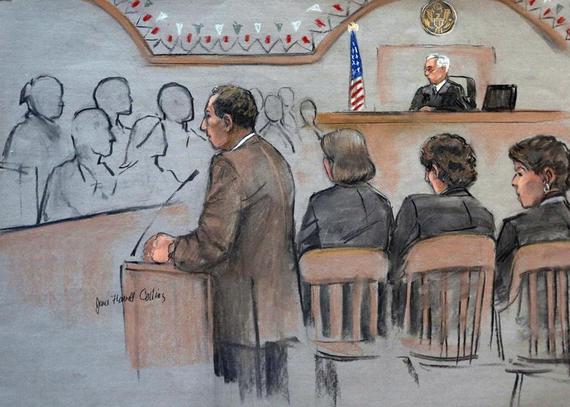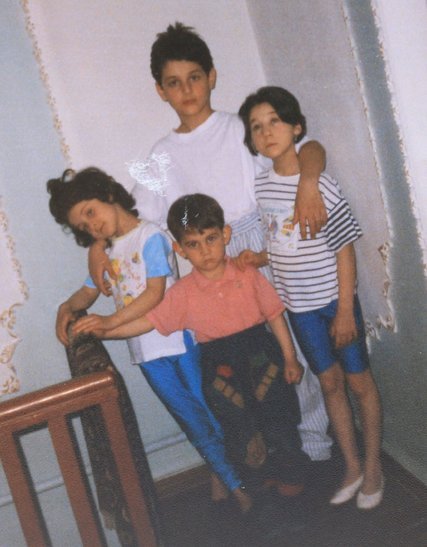Every day, people ask me what it is like to cover the Boston Marathon bombing trial for the media. What does it feel like to be in the courtroom? Have I seen Dzhokhar "Jahar" Tsarnaev? What is he like? Are the victims there? Do I think the jury will "let him off?"
In all honesty, covering Jahar's trial has been surreal in many ways. The courtroom only seats approximately 60 people. Since most courtroom seats are reserved for victims and their families, only a small handful of media outlets were granted passes to sit in the actual courtroom. The remainder of the press and the public sits in courtroom overflow rooms and watches the proceedings on a live video feed controlled by the judge. Recording, taking pictures, and broadcasting is not allowed inside the courthouse. Most reporters have taken to providing live updates of the proceedings via Twitter, and the only thing better than actual pictures are the friendly sketch artists who dot the front rows of the proceedings.
Side bar. They actually play jazz in court during sidebar. It's not an urban legend. #tsarnaev
— Anne Stevenson (@Stevenson_Live) March 24, 2015
Tuesday was the first day where I sat in the same courtroom where Jahar's trial was taking place. I was immediately taken aback by the heaviness inside the courtroom; it drove home the gravity and seriousness of the situation. There was a palpable sadness and fear in the air, mixed with the detached administrative dissonance of law enforcement. These were all sensations I could not sense from the detached comfort of the overflow room.
In the front row behind the Prosecution are the government's reserved seats, and in them sat men in suits. At one point, US Marshals asked the suits to reduce the volume of their laughter and banter during the proceedings.
Marshals ask suits sitting in govt section to keep it down. No idea what they are laughing at.Victim families sitting behind them. #tsarnaev
— Anne Stevenson (@Stevenson_Live) March 24, 2015
On the right side there are also several rows of victims and their families who are perhaps there seeking answers, closure, and to see things through. They are quite and never take their eyes off the front of the room. Some have visible disabilities from the bombings, missing limbs, scars.
In the middle of ballistics testimony, a French reporter was escorted out of court by marshals after her laptop began playing audio of a trial news clip. The reporters sit in the middle in cliques. Sometimes it feels like you are in a Roman Colliseum, a gladiator-like atmosphere where everyone wants to drum up the juiciest tidbits off the back of this morbid spectacle. It made me feel guilty for being part of it.
To the left are the seats reserved for the Defense, but most of those seats are empty.
Getting a look at Jahar's face is not easy because he is seated facing the judge, away from courtroom spectators, and he does not glance up at the people behind him. He often slouches down in his seat, fidgeting, maybe out of a mixture of physical discomfort, guilt, embarrassment, and the gravity of knowing just how obviously inexcusable what he has done is to those listening.
Jahar is no longer the bright-eyed kid from the cover of Rolling Stone magazine. Jahar's face is somewhat contorted, one of his eyebrows is caught in an overly arched position, he walks with a limp over a long stride, his left hand is affixed and curled unnaturally towards the ground, while his forearm faces upward. These physical deformities may be a result of some kind of traumatic brain injury Jahar sustained on April 19, 2013 when police dropped flash bang grenades on him and shot him in the head and body several times as he hid [unarmed] in a boat on Franklin Street in Watertown.
Yesterday, law enforcement testified about ballistics and evidence found at the crime scene. They are serious, confident, and they come and go in swarms to support each other. The prosecution's witnesses are a morbid parade who show us pictures of Jahar's bad grades, his messy bedrooms, his phone records, his internet use history, his iPods, and we look at the horrific aftermath of the crime scenes he has admitted to causing.
Even after Ferguson and the Whitey Bulger FBI corruption scandal, there is often a curious lack of curiosity in the courtroom, even from the media, when it comes to questioning statements that law enforcement has made. Truthfully, I don't understand this because the entire trial is about multiple breaches in national security. Some of the nation's best and brightest law enforcement experts have flown in from all around the country to testify at this trial to the fact that [despite warnings from the Russians, the millions of tax dollars spent on law enforcement training and perhaps millenniums of professional experience held between them,] they were out foxed and outsmarted by a 19-year-old stoner and his mentally ill older brother. That "self deployed" officers were injured by friendly fire while Jahar himself eluded the officer's physical clutches for another 19 hours [while surrounding cities "sheltered in place.']
After listening to all the police testimony, I still don't understand how this could have happened or how they all still got to keep their jobs.
In looking around the courtroom today, it struck me that the jazz music we hear during side bar sessions might be the last music Jahar ever hears. Jahar has already admitted responsibility for three murders, he will never taste freedom again. We are only in that courtroom for the jury to debate the merits of whether or not Jahar deserves to "live" behind bars the rest of his life, or alternatively, be put to death by lethal injection.
Truthfully, my sympathies are reserved for the victims of the April 2013 tragedies. Not a day goes by when I am not overcome by the stories the victims bravely told during the first week of trial. 8-year-old Martin Richard won't be starting little league with his friends this month. The pictures of the pools of blood in Officer Sean Collier's cruiser, his autopsy photos, how his life was cut short makes me tear up. Maybe Sean never understood how many people loved him, and his loved ones never had the chance to say goodbye.
In the mean time, the "old Jahar" is gone. Law enforcement put several bullets in him two years ago, and he's never coming back. The "new" Jahar spends his days in solitary confinement at a Federal penitentiary or in court watching experts recount his own horrific mistakes and the worst days of his life. Most of his close friends and family are either overseas, in the clutches of law enforcement, jailed, or have been deported.
As journalists, we are supposed to be objective and detached, but we should never become shamefully mechanical in our approach to such horrific events. As a mother, I'm constantly reminding myself that everyone in the courtroom is someone's son or daughter, that all babies are born perfect. Everyone, including probably Jahar, is struggling to understand why the Tsarnaev brothers allegedly committed such horrible crimes against humanity, but it's unlikely that we will ever get those answers.
Perhaps if Jahar did look back at us once in a while, the humanity left in his eyes would make us question our own hardened convictions about the value of his life (which we debate all day as if he can't hear us.)
This whole spectacle is not about "freeing Jahar," it is about freeing Boston. Killing Jahar won't bring the victims back to life, it won't heal the wounded survivors, and it won't make the public any safer from terrorists. As a local who lived through the events of April 2013, I think the people of Boston would probably heal and move on from these tragedies more efficiently if we showed Jahar the tolerance and compassion he and his brother could not find in their darkest hours. We are Americans, we do not execute our mentally disabled and or feed the least among us to the crocodiles when things go wrong. We do not maim, drug, and assassinate criminals in brutal public spectacles as ISIS does. Boston can rise above these tragic events without putting more blood on our hands.


